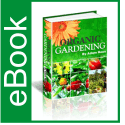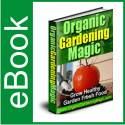Amazing Harvest from your Vegetable Garden Planting
Amazing Harvest from your Vegetable Garden Planting
Article by Paul A Jay
Relevant Topic……Composting
SubjectYou can grow fresh organic food in amazing quantities, in any soil. You do it more efficiently than conventional gardening, with less effort, and you don’t have to dig or heave heavy loads.
When you study the natural ecosystem, it shows why we could, and should do our vegetable garden planting in a more environmentally and ecologically friendly way. Mother nature has been looking after the planet in this way for millions of years.
If we are to make a difference to our planet, live economically and improve our lives we need to take positive action now. Look, growing our own abundant quality healthy organic food, in this way, will help us save money, become healthier, while looking after the planet.
The biggest challenge is convincing our traditional gardeners. It should not be, as gardening in this manner, is not only enjoyable but less time consuming. With a little planning and the ability to break away from the garden stereotype, you can become a hunter gatherer in your garden, harvesting the likes of your perennial lettuce and spinach beet and broccoli, year after year without the effort of spring planting.
Composting (For your soil, compost is gold)
Compost is simply organic material that has broken down into a lovely, rich soil like material. It is the best and cheapest soil conditioner you could ever find and is an integral ingredient in this form of vegetable gardening planting as it is in others. Compost is not only a good source of organic material, it also contains beneficial soil organisms which are critical for soil fertility…….Look after your soil and your plants will look after themselves.
Compost Bins Shop bought plastic compost bins with lids….. They are not overly expensive to buy. When you are creating your compost, they heat up quickly and with the right mix you will have compost within a month.On the down side they do not aerate well, so your mixture turns sloppy for a while. This will attract insects, an inconvenience for a short time, but you will still have compost within a month. Shop bought tumbler type compost bins are also available, these are probably the best and the quickest compost producing bins of all, but they are probably the most expensive to buy.
The most economical compost bin is the one you build yourself. You can assemble these from sheets of corrugated iron and some posts.
Creating compost
To create your perfect compost you need a combination of hot and cold ingredients.Hot ingredient examples….Fresh grass clippings, kitchen scraps, and manure.Cold ingredient examples…. Dried grass clippings, shredded newspaper, and dried leaves.
Your ingredients should be layered, in depths of no more than 15cm. Be careful not to apply too much of one material in a clump, as this will slow down your composting process. When applying the fresh grass clippings, occasionally you could mix a few dried leaves and a handful chicken manure pellets together helping to create heat speeding up the composting process.
If you have an over supply of some of your ingredients, store them aside and then, when you have more vegetable waste, mix them with some fresh grass clippings and add them to your compost.
Hints to finish
To speed up the process just add a few chicken manure pellets between layers. If your compost is drying out, (and this would only happen in very hot weather), just add water to it. And, if you think your compost is taking too long and not heating up, you should probably empty out the bin and put it all back in again. This will give it a good stir, again throw a handful of chicken manure pellets to help speed it along.
Your composting is a vital application necessary for you to grow your own quality, healthy organic food,from a garden so full of plants,it does’t look like anything you have ever seen before,every possible spare space is filled with lush,healthy foliage,and everything is edible.
Grow and enjoy your Harvest
Paul A Jay
About the Author
The Author of this Article is Paul A Jay. Paul was raised on a farm, and remembers many of the problems associated with growing vegetables.He has researched many methods and is passing on to others this garden experience that thousands of others have successfully implemented. You can gain the same knowledge and experience through the following link http://vegetablegardenplanting.org/
Use and distribution of this article is subject to our Publisher Guidelines
whereby the original author’s information and copyright must be included.

 July 26, 2012
July 26, 2012 







